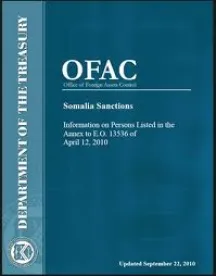On August 13, 2014, the Treasury Department's Office of Foreign Assets Control (“OFAC”) issued new guidance advising that it has changed its policy governing whether entities that are owned by individuals or entities designated under Executive Orders and regulations administered by OFAC, but are not themselves designated, are also subject to U.S. sanctions.
Pursuant to this new guidance, any entity that is owned 50 percent or more in the aggregate, directly or indirectly, by one or more parties on OFAC’s Specially Designated Nationals and Blocked Persons List (“SDN List”) is subject to blocking.1 This is a significant departure from prior OFAC guidance that it was not necessary to aggregate the ownership interests of separate SDN-Listed parties to determine whether a non-listed entity was considered to be blocked.
The new “50 Percent Rule” provides that, effective immediately, the property and interests in property of any entity owned 50 percent or more in the aggregate, directly or indirectly, by persons designated on the SDN List that are, or come into, the United States or the possession of control of a U.S. person are blocked and cannot be dealt in absent licensing or other authorization from OFAC. This means that U.S. persons are effectively prohibited from engaging in any dealings with any entity directly or indirectly owned 50 percent or more in the aggregate by one or more blocked parties regardless of whether such entity is itself designated on the SDN List.
In Frequently Asked Questions (“FAQs”) that OFAC issued on August 14 clarifying the scope of the new 50 Percent Rule, OFAC has provided that this new aggregation test also applies in determining whether entities that are not on the Russian Sectoral Sanctions Identifications (“SSI”) List are subject to the sanctions that apply to the SSI-Listed Russian banks and oil companies. Entities on the SSI List, and entities owned 50 percent or more in the aggregate by such SSI-Listed entities, are not subject to comprehensive blocking measures. Rather, they are subject to a more limited set of restrictions related to new debt with a maturity of longer than 90 days and, in the case of the SSI- Listed banks, new equity, in either case issued by, on behalf of, or for such an entity. For more information on the full scope of SSI List restrictions, please see our prior E-Alert dated July 30, 2014.
THE SCOPE OF THE 50 PERCENT RULE
OFAC’s FAQs offer the following additional guidance concerning the application of the new 50Percent Rule:
1 Certain OFAC sanctions programs are broader and also target entities that are controlled by sanctioned parties. For example, the Iranian Transactions and Sanctions Regulations apply to entities that are owned or controlled by the government of Iran. See 31 C.F.R. §§ 560.304 and 560.313. The 50 Percent Rule’s focus on ownership does not limit the broader scope of these sanctions programs.
The 50 Percent Rule applies only to ownership interests, not control. According to OFAC, “[a]n entity that is controlled (but not owned 50 percent or more) by one or more blocked persons is not considered automatically blocked” pursuant to the 50 Percent Rule. Nonetheless, companies should proceed with caution when considering a transaction with an entity that one or more blocked parties may control because OFAC could add that entity to the SDN List at some point in the future.
Consistent with prior guidance that OFAC has issued, companies should be careful not to negotiate, enter into contracts, or process transactions that involve a blocked person when the blocked person is acting on behalf of a non-blocked entity. OFAC sanctions “prohibit transactions involving, directly or indirectly, a blocked person…even if the blocked person is acting on behalf of a non-blocked entity.” This includes, for example, situations in which a blocked person signs a contract on behalf of a non-blocked entity.
Indirect ownership refers to “ownership of shares of an entity through another entity or entities that are 50 percent or more owned in the aggregate by the blocked person(s).” This means that if Blocked Person X owns 50 percent of Entity A, and Entity A owns 50 percent of Entity B, then both Entity A and B are blocked -- Entity A because it is directly owned 50 percent by Blocked Person X and Entity B because it is owned 50 percent by blocked Entity A. Similarly, if Blocked Person X owns 50 percent of Entity A and 10 percent of Entity B, and Entity A also owns 40 percent of Entity B, then Entity B is considered as blocked based on the aggregate 50 percent ownership of Entity B by two blocked parties.
By contrast, indirect ownership does not apply at all where a blocked party owns less than a 50 percent interest in the intermediate entity. Thus, if Blocked Person X owns only 25 percent of Entity A and 25 percent of Entity B, no matter how large an interest Entities A and B hold in Entity C, Entity C will not be considered blocked. This is because Blocked Person X’s 25 percent ownership of each of Entity A and Entity B falls short of 50 percent. Accordingly, neither Entity A nor Entity B is blocked and, for purposes of the 50 Percent Rule, Blocked Person X is not considered to indirectly own any of Entity C as a result of its minority ownership of Entities A or B.
While all of the OFAC examples in the FAQs address circumstances involving a single Blocked Person, the guidance would apply more broadly. For example, if Blocked Person X owns 50 percent of Entity A, and Entity A owns 25 percent of Entity B, and Blocked Person Y owns 50 percent of Entity C, which also owns 25 percent of Entity B, then the combination of the indirect ownership and 50 Percent Rule requirements may make Entity B a blocked person. While the FAQs do not address this situation, we believe OFAC would consider Entity B to be a blocked person since Entities A and C would each be considered blocked entities because of their 50 percent ownership by blocked persons, and in the aggregate they own 50 percent of Entity B.
Companies likely will need to undertake significant additional due diligence in order to collect the information about direct and indirect ownership interests that is necessary to make these complex calculations and to aggregate ownership information across multiple levels of a corporate structure. Indeed, OFAC urges companies considering a transaction to conduct “appropriate due diligence” on the involved entities in order to determine relevant ownership stakes.
Under certain limited circumstances, it may be possible for one or more blocked persons to divest their ownership stake in an entity in order to ensure that the combined ownership by blocked persons in the entity is less than 50 percent. However, these actions must be undertaken entirely outside of U.S. jurisdiction and without the involvement of any U.S. persons. Companies also should be careful to avoid “sham transactions” by conducting sufficient due diligence to be confident that any purported divestment actually occurred before they enter into any dealings with entities that were previously owned 50 percent or more by one or more designated parties.
If the aggregate ownership of blocked parties in an entity falls below 50 percent due to the actions of one or more of the blocked parties, including the entity itself, any property or interests in property that were previously in the United States or the possession or control of a U.S. person remain blocked and cannot be dealt in absent licensing or other authorization from OFAC. This is because OFAC does not recognize the unlicensed transfer of blocked property in the United States or in the possession or control of a U.S. person. This position imposes an additional layer of due diligence as it suggests that U.S. persons may need to conduct a retrospective analysis of the property of entities that they learn are minority owned by a blocked party in order to ensure that the entity was not previously owned 50 percent or more in the aggregate by blocked parties.








 />i
/>i

